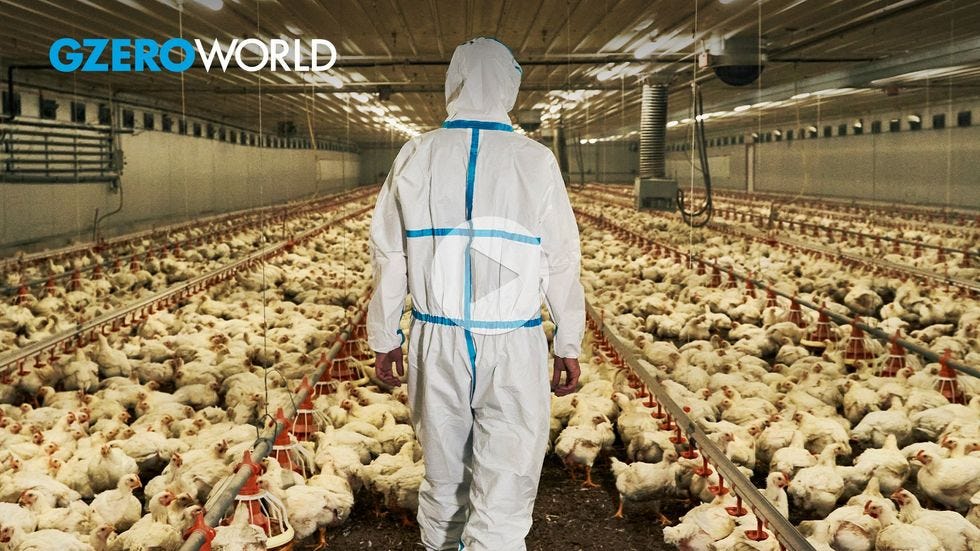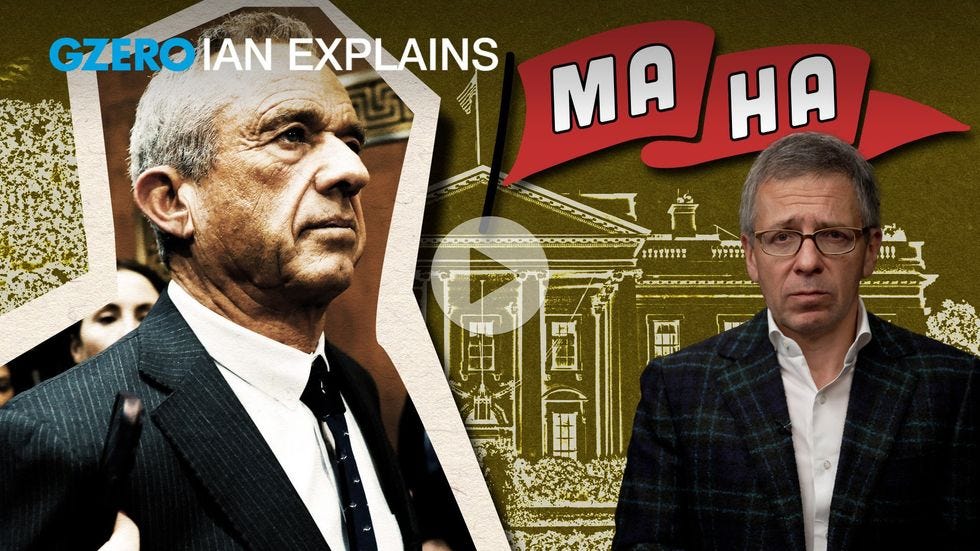Dear reader,
This week, I explain Friedrich Merz’s migration gambit, talk to health reporter Apoorva Mandavilli about bird flu, and break down RFK Jr.’s MAHA agenda. Plus, your weekly rec from my dog Moose.
Let’s get to it,
- Ian
Germany’s Friedrich Merz and a bold political gamble
In countries across Europe, nativist far-right political parties have dramatically expanded their vote share in recent years, in part by arguing that more permissive migration and border policies are creating economic and social havoc. The political power of that message was on full display last weekend when leaders of the newly minted Patriots for Europe bloc told some 3,000 supporters in Madrid that it’s time to “Make Europe Great Again.” That group includes Hungary’s Prime Minister Viktor Orbán, France’s Marine Le Pen, the Netherlands’ Geert Wilders, Italy’s Matteo Salvini, the Czech Republic’s Andrej Babiš, and Austria’s Herbert Kickl.
🔔 Subscribe to GZERO Media for free to get timely global analysis and news. For exclusive content and the chance to engage with a community of thinkers, and be a part of the conversation shaping our world 🔔
Italy’s Fratelli d’Italia, Poland’s Law and Justice, and Germany’s Alternative for Germany (AfD) parties have so far remained outside the bloc, but the European Conservatives and Reformists group, which includes Italy’s Prime Minister Giorgia Meloni, published a letter last month warning Europe’s center-right establishment to work more closely with the Patriots to obstruct left-wing migration, green, and other “woke” policies. Part of the goal, argued the letter’s authors, is to build durable new ties with US President Donald Trump.
This is the backdrop for a clever political maneuver from Friedrich Merz, leader of the traditional center-right Christian Democrats (CDU/CSU) and the prohibitive favorite to become Germany’s next chancellor following a general election on Feb. 23. Merz has wrestled for weeks with the question of how to peel voter support away from the anti-immigrant AfD — without appearing to cooperate with a party that many Germans consider openly fascist.
During a late January parliamentary vote on toughening Germany’s asylum and refugee policy, Merz’s CDU accepted support from the AfD for a tougher border approach without publicly seeking it. For the first time in the country’s postwar history, a non-binding motion passed the Bundestag with the help of the far right, shattering a decades-old taboo. In response, the AfD’s many critics among political officials, the media, and the public turned the rhetoric up to 11. Merz stood accused of tearing down the political firewall that separates Germany’s center right from the far right and throwing open the “gates of Hell.” Protests, some of them violent, erupted across the country. The measure was narrowly defeated.
Then came the political jiu-jitsu from Merz. The political veteran refused to apologize. He argued that he had not sought support from the AfD and that the political firewall that continues to leave the nativist party in the isolation ward remains fully intact, vowing to never form a coalition with it. But, argued Merz, the new immigration restrictions were the correct policy for Germany. They remain the right policy, even when supported by the wrong people.
Next came a polling surprise. Not only did this dust-up fail to damage Merz’s pre-election popularity ratings, but the display of political backbone strengthened his party’s position in pre-election polling. We shouldn’t be surprised. Merz is widely viewed as a capable technocrat but not an exciting politician. His move on migrant policy, and the willingness to take hits for perceived cooperation with the AfD, is seen as a major political gamble on the eve of an election he’s already favored to win.
💬 Got a question you’d like answered? Or thoughts on anything you’ve read so far? Let me know in the comments below—I’d love to hear from you!
By both defying political consensus and then reaffirming that direct cooperation with the AfD remains out of bounds, Merz has presented himself as a more forceful leader than current Chancellor Olaf Scholz. By breaking the taboo on tougher migration and asylum rules, he has also boosted the credibility of political arguments that equivocation on these policies by Scholz and his government has done more to boost the AfD than Merz’s party has done or will do.
Migration has been the primary fuel for the AfD’s surge over the past decade as the number of asylum-seekers has overwhelmed a German system designed for much smaller numbers of people. The CDU/CSU can now feel vindicated in their migration policy strategy and can open more space for tougher policies backed by centrist parties, robbing the AfD of its go-to campaign topic. In fact, it was Christian Lindner — leader of the pro-business Free Democrats and the man whose dismissal as finance minister in November collapsed Scholz’s coalition government — who made the argument most forcefully: “Democracy must deliver so that people don’t look for an alternative to democracy.”
If the CDU/CSU wins on Feb. 23 and Merz becomes the next chancellor, highly likely outcomes, he may have scored a political win that other center-right parties in Europe have consistently missed. In France and Britain, traditional conservatives have taken a migration beating. Following last July’s second-round parliamentary elections in France, Le Pen’s populist-nationalist National Rally won more than 37% of votes to just 5.4% for the traditional center-right Les Republicans. In the UK, the Conservative Party, which held power for 14 years before losing to Labour late last year, finished third place (!) in a poll published last week. Nigel Farage’s UK Reform Party, the most hardline anti-immigration choice on offer, has pushed past Labour to take the lead, though within the poll’s margin of error.
Has Merz changed the political rules on how Europe’s center-right handles the always emotive topic of immigration? Time will tell. If so, Merz’s bold political gamble might be remembered as a game-changer well beyond Germany.
📢 Agree, disagree, or somewhere in between? Share this post and let the debate travel.
A message from our sponsor Walmart
"Walmart has helped us lead the trend of non-alcoholic beer"
Walmart is fueling American jobs and strengthening communities by investing in local businesses. Athletic Brewing landed a deal with Walmart in 2021. Since then, co-founders Bill Shufelt and John Walker have hired more than 200 employees and built a150,000-square-foot brewery in Milford, CT. Athletic Brewing is one of many US-based suppliers working with Walmart. By 2030, the retailer is estimated to support the creation of over 750,000 US jobs by investing an additional $350 billion in products made, grown, or assembled in America. Learn more about Walmart’s commitment to US manufacturing.
Should we worry about bird flu in the US?
A strain of bird flu known as H5N1 has been circulating in the US in poultry and dairy cattle since 2024. But over the last few months, fears have grown about the virus’ accelerating spread to humans, especially after the first death was reported in Louisiana in January. How worried should we be that this could be the beginning of a new pandemic?
On GZERO World, I spoke with New York Times science and global health reporter Apoorva Mandavilli, who says that now is the time to start taking bird flu more seriously. One big reason for that is that the flu virus is very good at adapting, picking up characteristics that keep it spreading. “Surveillance has been just really, really poor. We don’t actually know what this virus is doing, how it’s evolving, how widely it’s spread,” Mandavilli says. “That first death was quite a wake-up call.”
With Robert F. Kennedy Jr. set to lead the US Health Department, Mandavilli worries about the nation’s ability to deal with a bird flu epidemic, particularly given his skepticism of vaccines and support for raw milk, which can harbor the bird flu virus and pose serious risks to public health. Would the Trump administration be willing to do what it takes to contain an outbreak?
Watch the clip here and catch my full interview with Mandavilli on the latest episode of “GZERO World with Ian Bremmer,” also airing on your local public television station.
The MAHA movement, explained
Barring unexpected confirmation troubles, Robert F. Kennedy Jr. is poised to become the country’s most powerful public health official. What is his “Make America Healthy Again” movement about, and what will it mean for the future of US health policy?
The MAHA worldview blends concerns about corporate influence on health care with deep skepticism toward established medical science. It combines wellness culture and vaccine hesitancy, alternative medicine and deep-state conspiracy. The MAGA-verse is sprawling – its supporters want to take on big medicine, eliminate processed foods, remove environmental toxins, and curb vaccine mandates. Like MAGA and so many other themes in our politics right now, it’s a product of collapsing American trust in institutions – and one that defies ideological boundaries.
What makes MAHA tricky is that it mashes common-sense health advice, like exercise and healthy eating, together with pseudoscience and misinformation, like unpasteurized milk and unfluoridated water. It also traffics in conspiracy theories that public health agencies are in bed with Big Pharma to keep people sick for profit.
Watch me explain why this matters here.
Moose’s treat of the week
"It's Time to Worry About DOGE's AI Plans" by Bruce Schneier and Nathan Sanders, a sobering look at how replacing civil servants with AI could fundamentally alter the checks and balances built into our system, allowing future presidents to exercise unprecedented “command and control” over government operations with the press of a button.











The Democrats didn’t get caught off guard—they let it happen. While Trump was preparing, they were hesitating. Now, Project 2025 is here, and the clock is ticking. This piece I wrote lays out exactly how they failed—and what they must do right now to fight back.
I would love your thoughts on the piece.
https://jasonegenberg.substack.com/p/the-democrats-failure-to-stop-project